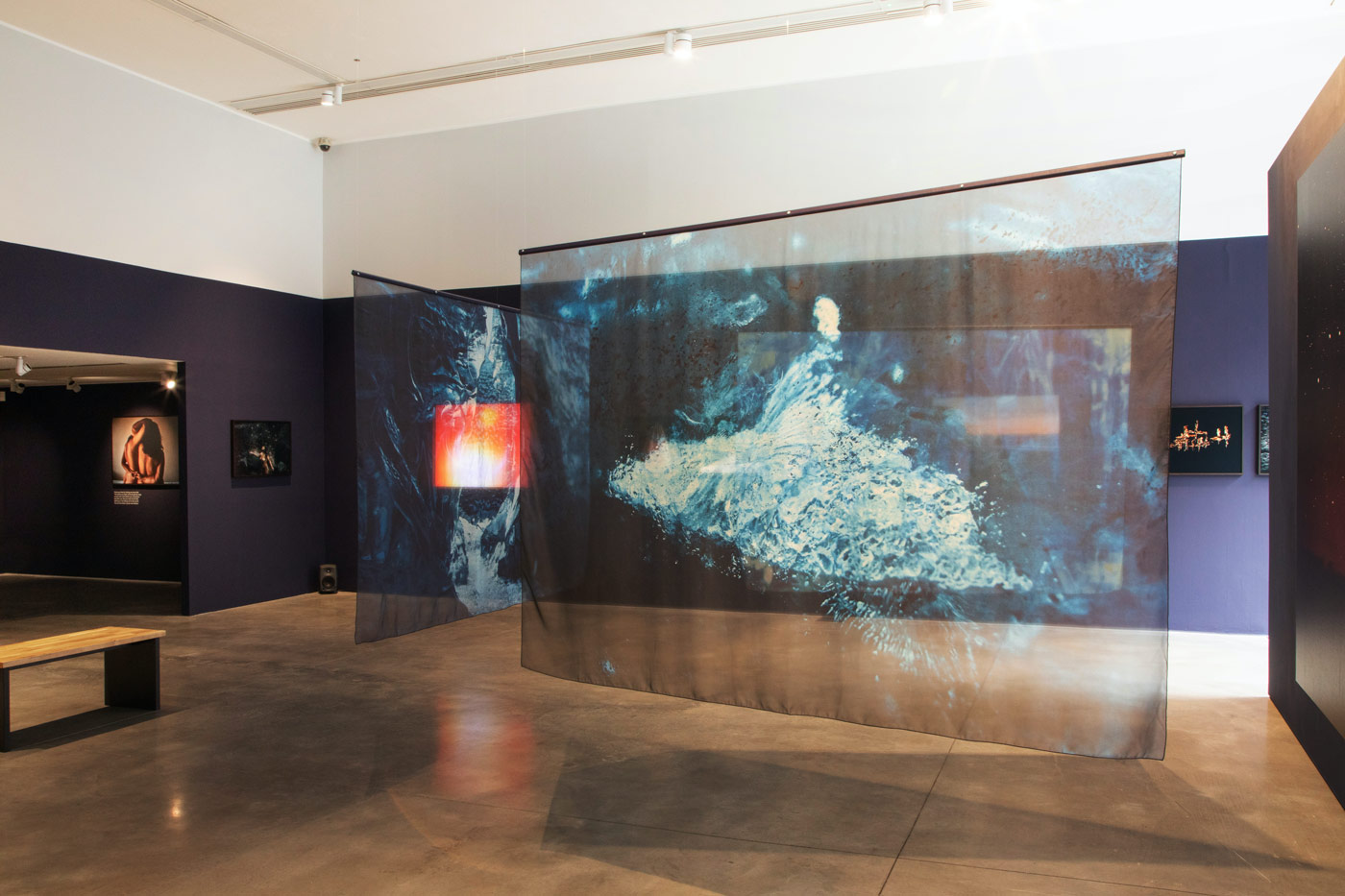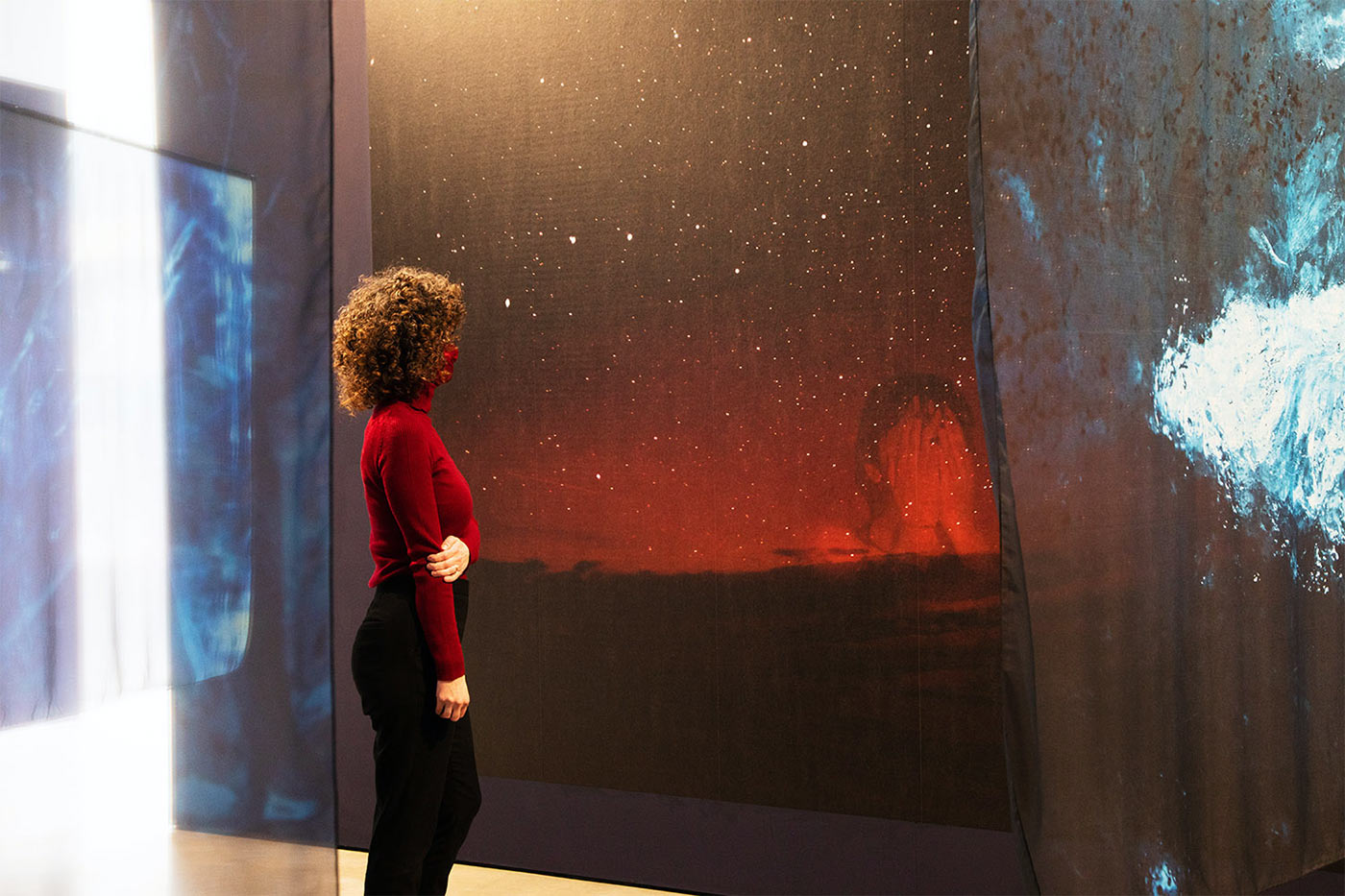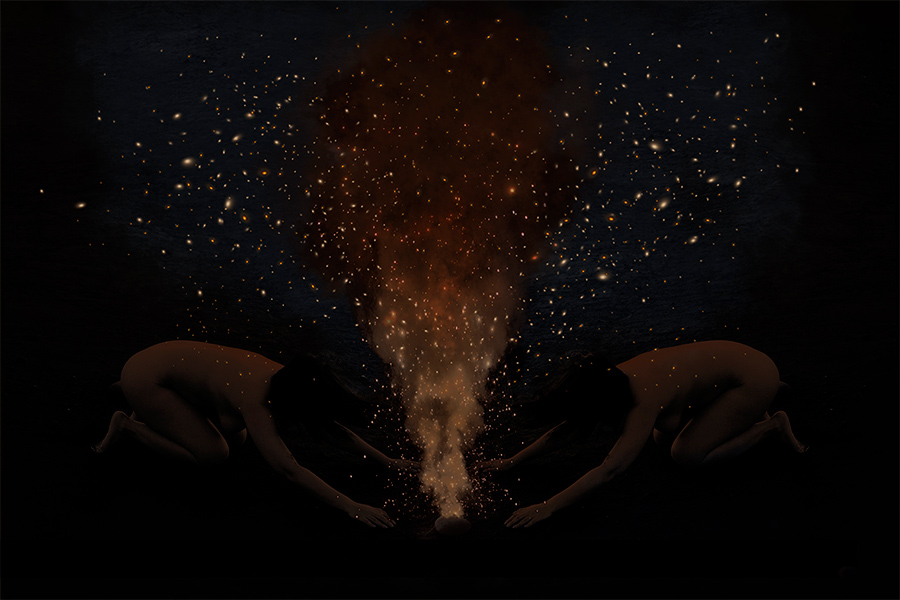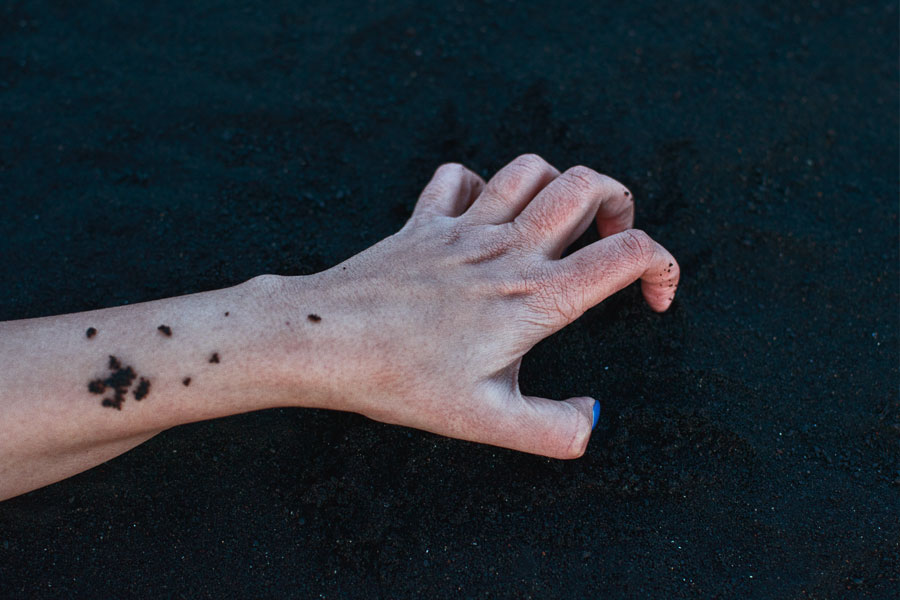Poulomi Basu is an Indian transmedia artist, photographer and activist whose work advocates for the rights of marginalised women using the power of photography as a tool for storytelling – amplifying the voices of women from the majority world.
Autograph's Curator, Bindi Vora, has worked closely with Basu throughout the development of the powerful exhibition, Fireflies, currently on display at Autograph. Using photography, video and sound, this new body of work reflects on the claustrophobia of home and dreams of freedom, defiance, and transcendence. Here, the artist joins Vora to discuss Basu’s collaboration with her mother, and the exploration of trauma, self-care and worldbuilding in her practice.
Please note this article discusses sensitive issues including a personal narrative of trauma and patriarchal violence.
Bindi Vora: Firstly, I wanted to start by saying how much of a pleasure and privilege it has been to work with you, and curate Fireflies, the exhibition currently on display at Autograph, London. We’ve been speaking about this new work for over two years now which was partly developed during your Autograph / Light Work artist residency in 2019, but has also continued to evolve in the lead up to the exhibition. During our last conversation we touched upon some aspects of the series following the residency, what has it been like for you to shape the work since then?
Poulomi Basu: I started developing Fireflies in 2019 just before I went to Syracuse for the Autograph / Light Work artist-residency. Since then, we’ve been living through a pandemic, so the work has continued to brew and it’s given me time to think a lot about how to extend the images that you see in the series. Some of the photographs are not just photographs, they have multiple layers made up of three-dimensional computational elements, almost becoming a painting inside the photograph – a technique I have been exploring.
I have also spent this time working in collaboration with my partner, the filmmaker CJ Clarke, on the two-screen science fiction film works you see in the exhibition. One is an expressionist dance performance in which I depict the sense of being trapped in a void, or an upside-down psychological realm. This particular film speaks to the mental illness that I live with and expresses an accumulation of emotions and states of being. The second corresponding science-fiction short film is about freedom and transcendence, which we discussed in our last conversation. For me, the interesting thing is that, when thinking about what a science fiction film should or could be, people tend to think it’s about the future, but it’s not, is it? Because science fiction is about the present, our relationship to the world as it is right now and what it could mean for the future. It’s like looking into a mirror and seeing the back of your head. I am very proud of both the films; they feel like an achievement – let’s see where they’re headed.
BV: I wanted to ask about your inspirations. With this work in particular you are referencing works of science fiction and fantasy. Would you be able to share some of these references with us?
PB: Film references include the works of Daniel Villeneuve and Under the Skin by Jonathan Glazer. Science fiction authors who have influenced my work include Octavia Butler and Ursula K Le Guin.
BV: This idea of positionality is crucial to readings of the work. The series is political, emotional and carries a charge that you’ve often said goes beyond your experience, it feels cathartic. Why was the bigger conversation important to encapsulate in this series?
PB: Fireflies is about having agency over issues of shame and seeing our bodies as a space of political warfare and self-love, while also addressing issues of race and representation at the same time. Women’s bodies, black and brown bodies, are on the front line of violence, they hold so much pain and injury – how can we claim our position and achieve a level of freedom and/or power? For me, the practice of self-love is an important part of the answer, but it’s difficult to achieve - it’s not something we’re taught, but something we have to learn for ourselves. Fireflies navigates the intersections of embodiment and social justice, and in so doing, becomes about dismantling oppression, and essentially resurrection, which form the larger themes in the work.
The series utilises real life as well as staged photography. I want to force the audience to examine how societies—future and present—treat women and the planet. It is fiction acting like a mirror to enable us to gaze back into our darker selves. The work is really a fable, narrating intricate and hugely imaginative tales about violence, race, life, death and above all love.
BV: The films are especially powerful. Being surrounded by the photographs and listening to the narration that reverberates around the space, you are urged to slow down, to look deeper and closer - it requires you to make connections between the photographs and the moving image work. There is one particular line from the script that always makes me pause: “Everything changed that day. My father wept. The battles were soon to begin. Our relationship … was a casualty of that war. It raged until his sudden death.” Your mother is a key collaborator in this work and you’ve staged some very poignant, beautiful moments that really speak about the intimacy and bond that you have. What was the dialogue like as you were making the work?
PB: My mother and I have been speaking about making this work for a long time and it is an accumulation of both our lived experiences, including my journey to find emancipation. I feel like my mother has learnt a lot by seeing my journey; many South Asian women of her generation have been indoctrinated and are told their lives hold little value, or that they don't have potential - they become invisible. But being visible and living for yourself, loving yourself and not being ashamed of yourself is a real journey and I feel like she has discovered this. It has been a constant dialogue between us over the last decade or so: she has often told me that she wished she was living life like me and could have the life that I have now. She had to sacrifice so much of herself in order to raise her children and be able to give them something more than what she had. On a regular basis she was reminded that her life was never her own and it was controlled by men, such as my father. These archaic values have occurred over many generations in my culture where women should ‘not be heard’; they become confined within domestic spaces, trapped by both the physical space of the home but also by the violence of their positionality.
For me, one of the most important struggles is in trying to recover our voices and in so doing, the realisation that our silence will not save us. Fireflies is a journey of coming out and reclaiming yourself, reclaiming your body and reclaiming your voice. A lot of these ideas and values are notions that my mother and I wanted to confront and are intrinsic to the work.
 Poulomi Basu: Fireflies at Autograph
Poulomi Basu: Fireflies at Autograph Poulomi Basu: Fireflies at Autograph
Poulomi Basu: Fireflies at AutographBV: I’ve recently been re-reading the wonderful late bell hook’s book All About Love in which she very generously and honestly unpacks the notion of self-love and our perception of what it means to love ourselves ‘as though the idea implies too much narcissism or selfishness’.¹ As I look back at your previous works, I really see Fireflies as a keystone for your practice. It roots itself deeply in the importance of advocacy and empowerment which forms such a strong part of your work.
PB: Yes, Fireflies grounds all of my previous works, it’s an important series. If I reflect on everything I have done in the last fifteen years, Fireflies sits in the centre, from To Conquer Her Land, Blood Speaks, and even Centralia… These works are an accumulation of stories about women, the environment, and about systemic violence that I deeply care for and that I feel need to be addressed. But Fireflies is the heart of all my artistic work. I have always felt like the stories I am telling about other people are personal, they come from a place deep inside myself, I share a connection with them. There is a lingering question of why I didn’t make this expressly personal work earlier, well the simple fact is that trauma is a big BIG bully and it has taken a long time for me to feel ready to make this work. Trauma is so hard to process, and the triggers are so fierce that you almost avoid every single space and every single conversation that can trigger the trauma until you finally find yourself on a day when you are ready to face it. It’s taken until now for my mother and I to both feel ready to tell our story.
 Poulomi Basu, from Fireflies, 2019 - ongoing
Poulomi Basu, from Fireflies, 2019 - ongoing Poulomi Basu, from Fireflies, 2019 - ongoing
Poulomi Basu, from Fireflies, 2019 - ongoingBV: I’ve said to you many times, it’s not only incredibly courageous and brave of you to make this work but it's a very generous gift to share your story with us. As I’ve spent more time with the work, I have enjoyed seeing how the series oscillates between majestic and expansive landscapes but also offers small glimpses into very intimate private moments. In curating the exhibition we looked through the images together, and the glacial landscapes became an important metaphor for depicting the ways in which you could flow between ‘spaces’ or ‘realms’ – it also formed part of the curatorial concept to devise a sculptural yet ephemeral enclave in the centre of the gallery. Could you talk a little bit about the importance of portals as a concept to you and your work?
PB: I studied sociology, with a focus on social sciences which is why my work feels realistic and accessible, especially to those not accustomed to the strange worlds of sci-fi and fantasy. I want to reach audiences who aren’t able to see themselves in predictable stories of daring masculinity or testosterone-fuelled space adventures - I want them to be able to turn to Fireflies, and spin fantasy through a feminist lens.
The work is intergalactic, it grapples with science fiction and the fantastical – it provides a way of envisaging your world now and your world in another dimension – a space of freedom and transcendence. I see this as a brave new world where survivors of domestic violence can find themselves in a space that is their own, one they can build and nurture. As I mentioned earlier, science fiction isn’t necessarily about the future, it is very much about the present too. The portals in my work therefore act as mirrors through which you can see your future: as you look at the work, it situates you and where you are standing as the past, so that what you are seeing is essentially the back of yourself from another dimension.
The images in the exhibition are meant to flow in and out of dream-like experiences, then back to reality, playing with surrealism, magical realism, and science fiction. The work moves between Calcutta and otherworldly landscapes shot across different parts of the world, including Iceland. I want to express the idea that there is another world that will soon be realised, and women are going to be in the centre of it: they are going to create and build that world.
Contemporary sci-fi is now full of authors who don’t follow the rules - writers who blend elements of magic and hard science fiction. Many of them, like me, focus on gender, feminism, and climate change. Science fiction and fantasy are not lesser forms of storytelling. They matter.

"The photography, film and dance in Fireflies is an act of embodied activism. It is an act of sharing one’s way of listening to the body, listening to the earth and each other, in a way that supports others to do the same."

BV: Absolutely. I think it’s these accumulated experiences that you’ve described throughout our conversation which conjure thoughts towards journeys and different states of being all of which come together as you watch the films. I am really struck by the dualities they represent - in one film we’re being taken on a journey through an undefined, uncharted landscape and in the other we are compelled by a darkened figure who sends ripples through movement whilst still portraying a very real feeling of confinement.
PB: The dance performance in the film represents what it is for a domestic violence survivor or victim to be trapped in a void, in terms of violence, systemic injustice and mental illness. The void is the upside-down world that you are seeing but shouldn’t be in, a space that you are trapped in. The creation of the expressionistic dance becomes a means to break out from that realm of confinement. This is the fight that I have always felt, the one I am battling with on a daily basis. I live with a major depressive disorder, anxiety, and poor brain health; I am constantly fighting against the monster inside me, the darkness inside me, that envelopes, consumes and encompasses me – I am always fighting to come out of that world and take myself to a better place, to the future world where I can build or create something. The photography, film and dance in Fireflies is an act of embodied activism. It is an act of sharing one’s way of listening to the body, listening to the earth and each other, in a way that supports others to do the same.
Poulomi Basu: Fireflies is on display at Autograph until 4 June 2022
______
¹ bell hooks, 2001. All About Love: New Visions. New York: HarperCollins, p.66, ch.4.
Poulomi Basu's deeply emotive and powerful new series of works, Fireflies, is on display at our Gallery in Hackney, London until 4 June 2022.
Find out more and book your free tickets hereCan you spare a few moments? Autograph is carrying out a survey to better understand who our digital audiences are. The survey should take no longer than five minutes to complete. Anything you tell us will be kept confidential, is anonymous and will only be used for research purposes.
The information you provide will be held by Autograph and The Audience Agency, who are running the survey on our behalf. In compliance with GDPR, your data will be stored securely and will only be used for the purposes it was given.
You can take the survey here. Thank you!
Banner image:
Poulomi Basu, from Fireflies [detail], 2019 – ongoing. Courtesy the artist.
Page images from top, left to right:
1, 6 + 8) Poulomi Basu, from Fireflies, 2019 – ongoing. Courtesy the artist. 2 + 3) Poulomi Basu, from Fireflies [still], 2019 - ongoing. Courtesy the artist. 4 + 5) Installation view of Poulomi Basu: Fireflies exhibition at Autograph, London. 4 Mar – 4 Jun 2022. Curated by Bindi Vora. Photograph by Zoë Maxwell.
Discover more images:
1 + 4) Poulomi Basu, from Fireflies [detail], 2019 – ongoing. Courtesy the artist. 2) Poulomi Basu, from Centralia [detail], 2019 - ongoing. Courtesy the artist. 3) Rotimi Fani-Kayode, Adebiyi, 1989. Courtesy Autograph, London.
Autograph is a space to see things differently. Since 1988, we have championed photography that explores issues of race, identity, representation, human rights and social justice, sharing how photographs reflect lived experiences and shape our understanding of ourselves and others.